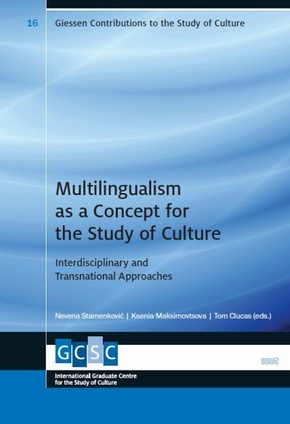Multilingualism as a Concept for the Study of Culture - Interdisciplinary and Transnational Approaches
| Verlag | WVT Wissenschaftlicher Verlag Trier |
| Auflage | 2021 |
| Seiten | 170 |
| Format | 15,7 x 1,3 x 23,3 cm |
| Gewicht | 315 g |
| Artikeltyp | Englisches Buch |
| Reihe | Giessen Contributions to the Study of Culture 16 |
| ISBN-10 | 3868218866 |
| EAN | 9783868218862 |
| Bestell-Nr | 86821886A |
The concept of multilingualism has produced a large body of scholarly literature across the humanities and social sciences in recent years. By opening up the dialogues between various disciplinary and national perspectives, this volume aims to develop multilingualism as a travelling concept for the study of culture, in the sense elucidated by Mieke Bal. The contributions in this volume examine multilingualism from a variety of theoretical and methodological perspectives. The volume investigates multilingualism in three main ways: first, as a socio-political condition and the point of conflict between different political forces, especially in the context of post-Soviet multi-ethnic societies in transition; second, as a method employed in multilingual classroom settings; and third, in multilingual literary works. The multilingual texts analysed in these contexts address various challenges of inhabiting 'in-between spaces'. At the same time, they provide frameworks for addressing the se challenges by showing how multilingual speakers and texts re-signify the beliefs, ideologies, and histories which shape the conditions of multilingual societies and the experiences of individuals. By exploring multilingualism through a variety of methods and approaches, the articles in this volume themselves comprise a multilingual project which encompasses a wide range of languages, disciplines, and texts from around the globe.
TABLE OF CONTENTS
TOM CLUCAS, KSENIA MAKSIMOVTSOVA AND NEVENA STAMENKOVIC
Introduction ................................................................................................................... 1
I. SOCIETAL RESPONSES: LANGUAGE POLICIES
AND IDEOLOGIES IN MULTILINGUAL SOCIETIES
THOMAS DAIBER
Emotional Multilingualism .......................................................................................... 17
EKATERINA PANKOVA
Language and Ideology: Analysis of the Debate on the Foundations
of the State Cultural Policy in Today's Russia ............................................................ 23
KSENIA MAKSIMOVTSOVA
Language Policy in Contemporary Estonia, Latvia, and Ukraine:
Is There a Room for the State Bi-/Multilingualism? .................................................... 43
DAUREN BAKHYTZHANOVICH BORANBAYEV
Multilingualism in Kazakhstan: Peculiarities of the Functioning
of the Kazakh and Russian Languages in Political Discourse ..................................... 59
CHRISTINA KORB
Languages in School: On the Perception and Manifestation
of Pupils' Multilingualism ........................................................................................... 71
II. LITERARY RESPONSES: MULTILINGUALISM,
IDENTITY AND MIGRATION IN LITERARY FICTION
TOM CLUCAS
"Multilingual Tomb-stone": The Limits of Multilingualism
in James Joyce's Finnegans Wake ............................................................................... 89
ANA MARÍA CALLEJAS TORO AND JULIANA GÓMEZ MEDINA
Multilingualism in Colombian Caribbean Literature:
Symbolic Systems of Multilingual Lexical Choices in
Gabriel García Márquez's One Hundred Years of Solitude ......................................... 99
NEVENA STAMENKOVIC
Approaches to Multilingualism in Language Education:
Teaching Multilingual Literature ............................................................................... 111
MIRUNA BACALI
Quo Vadis, Romania? Constructing Europeanness in Post-1989 Romania
from a Multilingual and Translational Perspective .................................................... 125

